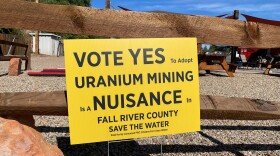One lawyer says the voters in the southwestern corner of the state have exposed an unanswered legal question.
Voters in Fall River County declared uranium mining a nuisance this November.
Backers of the nuisance initiative hope it will halt a proposed uranium project in the southwestern Black Hills.
The project manager for the Dewey Burdoch in-situ extraction project calls the designation ‘illegal’ and points to state law that says nothing which is maintained under express authority of a statute can be deemed a nuisance.
“There’s no black and white answer," said Dave Ganje, an environmental lawyer from Rapid City. “South Dakota has discussed this at the Supreme Court level, to an extent.”

The case is Kuper versus Lincoln-Union Electric company from 1996—a case where a dairy farmer dealt with stray voltage inside their barn.
“It has not directly address what you’re dealing with now—the in-situ mining process," he added.
Ganje said whether the nuisance declaration is legal is based on an undefined term: business of a public nature.
In the Kuper case, the state Supreme Court defines two categories of businesses that are protected from being declared a nuisance—“public utilities and businesses of a public nature.”
“That second one is probably what comes closest to the issue, here,” Ganje said. “That has not been decided by the South Dakota Supreme Court, on a project such as this or similar to this. So, it is unanswered.”
The manager for the Dewey-Burdoch uranium project has declined to say whether enCore Energy will challenge the declaration.
The state permitting process is on hold until challenges to the Nuclear Regulatory Commission and Environmental Protection Agency permit appeals conclude.
Another company—Pegasus Resources—says it's backing out of an agreement to acquire nearly 150 mining claims in Fall River. It cites negotiation failures and local opposition to uranium mining as a reason.




